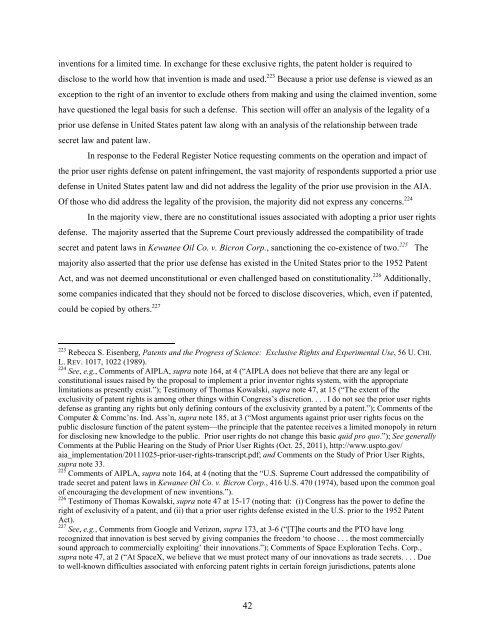Prior User Rights Study Report to Congress - America Invents Act
Prior User Rights Study Report to Congress - America Invents Act
Prior User Rights Study Report to Congress - America Invents Act
You also want an ePaper? Increase the reach of your titles
YUMPU automatically turns print PDFs into web optimized ePapers that Google loves.
inventions for a limited time. In exchange for these exclusive rights, the patent holder is required <strong>to</strong>disclose <strong>to</strong> the world how that invention is made and used. 223 Because a prior use defense is viewed as anexception <strong>to</strong> the right of an inven<strong>to</strong>r <strong>to</strong> exclude others from making and using the claimed invention, somehave questioned the legal basis for such a defense. This section will offer an analysis of the legality of aprior use defense in United States patent law along with an analysis of the relationship between tradesecret law and patent law.In response <strong>to</strong> the Federal Register Notice requesting comments on the operation and impact ofthe prior user rights defense on patent infringement, the vast majority of respondents supported a prior usedefense in United States patent law and did not address the legality of the prior use provision in the AIA.Of those who did address the legality of the provision, the majority did not express any concerns. 224In the majority view, there are no constitutional issues associated with adopting a prior user rightsdefense. The majority asserted that the Supreme Court previously addressed the compatibility of tradesecret and patent laws in Kewanee Oil Co. v. Bicron Corp., sanctioning the co-existence of two. 225 Themajority also asserted that the prior use defense has existed in the United States prior <strong>to</strong> the 1952 Patent<strong>Act</strong>, and was not deemed unconstitutional or even challenged based on constitutionality. 226 Additionally,some companies indicated that they should not be forced <strong>to</strong> disclose discoveries, which, even if patented,could be copied by others. 227223 Rebecca S. Eisenberg, Patents and the Progress of Science: Exclusive <strong>Rights</strong> and Experimental Use, 56 U. CHI.L. REV. 1017, 1022 (1989).224 See, e.g., Comments of AIPLA, supra note 164, at 4 (“AIPLA does not believe that there are any legal orconstitutional issues raised by the proposal <strong>to</strong> implement a prior inven<strong>to</strong>r rights system, with the appropriatelimitations as presently exist.”); Testimony of Thomas Kowalski, supra note 47, at 15 (“The extent of theexclusivity of patent rights is among other things within <strong>Congress</strong>’s discretion. . . . I do not see the prior user rightsdefense as granting any rights but only defining con<strong>to</strong>urs of the exclusivity granted by a patent.”); Comments of theComputer & Commc’ns. Ind. Ass’n, supra note 185, at 3 (“Most arguments against prior user rights focus on thepublic disclosure function of the patent system—the principle that the patentee receives a limited monopoly in returnfor disclosing new knowledge <strong>to</strong> the public. <strong>Prior</strong> user rights do not change this basic quid pro quo.”); See generallyComments at the Public Hearing on the <strong>Study</strong> of <strong>Prior</strong> <strong>User</strong> <strong>Rights</strong> (Oct. 25, 2011), http://www.usp<strong>to</strong>.gov/aia_implementation/20111025-prior-user-rights-transcript.pdf; and Comments on the <strong>Study</strong> of <strong>Prior</strong> <strong>User</strong> <strong>Rights</strong>,supra note 33.225 Comments of AIPLA, supra note 164, at 4 (noting that the “U.S. Supreme Court addressed the compatibility oftrade secret and patent laws in Kewanee Oil Co. v. Bicron Corp., 416 U.S. 470 (1974), based upon the common goalof encouraging the development of new inventions.”).226 Testimony of Thomas Kowalski, supra note 47 at 15-17 (noting that: (i) <strong>Congress</strong> has the power <strong>to</strong> define theright of exclusivity of a patent, and (ii) that a prior user rights defense existed in the U.S. prior <strong>to</strong> the 1952 Patent<strong>Act</strong>).227 See, e.g., Comments from Google and Verizon, supra 173, at 3-6 (“[T]he courts and the PTO have longrecognized that innovation is best served by giving companies the freedom ‘<strong>to</strong> choose . . . the most commerciallysound approach <strong>to</strong> commercially exploiting’ their innovations.”); Comments of Space Exploration Techs. Corp.,supra note 47, at 2 (“At SpaceX, we believe that we must protect many of our innovations as trade secrets. . . . Due<strong>to</strong> well-known difficulties associated with enforcing patent rights in certain foreign jurisdictions, patents alone42


